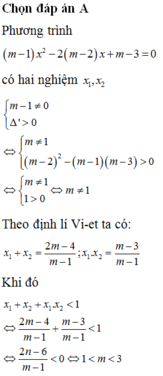Với tất cả giá trị nào của tham số m thì phương trình ( m - 10 ) x 2 - 2 ( m - 2 ) x + m - 3 = 0 có hai nghiệm x 1 , x 2 thỏa mãn x 1 + x 2 + x 1 . x 2 < 1
A. 1<m<3.
B. 1<m<2.
C. m>2.
D. m>3.
Hãy nhập câu hỏi của bạn vào đây, nếu là tài khoản VIP, bạn sẽ được ưu tiên trả lời.


![]()

a) Khi \(m=1\) ta có phương trình \(x^2-3x+1=0\)
\(\Delta=3^2-4=5\)
Phương trình có 2 nghiệm phân biệt \(x_1=\dfrac{3-\sqrt{5}}{2};x_2=\dfrac{3+\sqrt{5}}{2}\)
b) Xét phương trình \(x^2-3x+m=0\left(1\right)\)
\(\Delta=9-4m\)
PT có hai nghiệm phân biệt \(\Leftrightarrow\Delta>0\Leftrightarrow9-4m>0\Leftrightarrow m< \dfrac{9}{4}\)
Áp dụng hệ thức Vi-et ta có: \(\left\{{}\begin{matrix}x_1+x_2=3\\x_1x_2=m\end{matrix}\right.\)
Để \(x_1^2+x_2^2=2021\Leftrightarrow\left(x_1+x_2\right)^2-2x_1x_2=2021\)
\(\Leftrightarrow3^2-2m=2021\Leftrightarrow2m=-2012\Leftrightarrow m=-1006\) (TM)

1.
Đặt \(\sqrt{x^2-4x+5}=t\ge1\Rightarrow x^2-4x=t^2-5\)
Pt trở thành:
\(4t=t^2-5+2m-1\)
\(\Leftrightarrow t^2-4t+2m-6=0\) (1)
Pt đã cho có 4 nghiệm pb khi và chỉ khi (1) có 2 nghiệm pb đều lớn hơn 1
\(\Leftrightarrow\left\{{}\begin{matrix}\Delta'=4-\left(2m-6\right)>0\\\left(t_1-1\right)\left(t_2-1\right)>0\\\dfrac{t_1+t_2}{2}>1\\\end{matrix}\right.\)
\(\Leftrightarrow\left\{{}\begin{matrix}10-2m>0\\t_1t_2-\left(t_1+t_1\right)+1>0\\t_1+t_2>2\end{matrix}\right.\)
\(\Leftrightarrow\left\{{}\begin{matrix}m< 5\\2m-6-4+1>0\\4>2\end{matrix}\right.\) \(\Leftrightarrow\dfrac{9}{2}< m< 5\)
2.
Để pt đã cho có 2 nghiệm:
\(\Leftrightarrow\left\{{}\begin{matrix}m\ne3\\\Delta'=1+4\left(m-3\right)\ge0\end{matrix}\right.\)
\(\Leftrightarrow\left\{{}\begin{matrix}m\ne3\\m\ge\dfrac{11}{4}\end{matrix}\right.\)
Khi đó:
\(x_1^2+x_2^2=4\Leftrightarrow\left(x_1+x_2\right)^2-2x_1x_2=4\)
\(\Leftrightarrow\dfrac{4}{\left(m-3\right)^2}+\dfrac{8}{m-3}=4\)
\(\Leftrightarrow\dfrac{1}{\left(m-3\right)^2}+\dfrac{2}{m-3}-1=0\)
\(\Leftrightarrow\left[{}\begin{matrix}\dfrac{1}{m-3}=-1-\sqrt{2}\\\dfrac{1}{m-3}=-1+\sqrt{2}\end{matrix}\right.\)
\(\Leftrightarrow\left[{}\begin{matrix}m=4-\sqrt{2}< \dfrac{11}{4}\left(loại\right)\\m=4+\sqrt{2}\end{matrix}\right.\)

\(\Delta'=\left(m+1\right)^2-\left(m^2+2m\right)=1>0\)
\(\Rightarrow\) Phương trình luôn có 2 nghiệm: \(\left\{{}\begin{matrix}x_1=m+1-1=m\\x_2=m+1+1=m+2\end{matrix}\right.\)
\(\left|x_1\right|=3\left|x_2\right|\Leftrightarrow\left|m\right|=3\left|m+2\right|\)
\(\Leftrightarrow\left[{}\begin{matrix}3m+6=-m\\3m+6=m\end{matrix}\right.\) \(\Rightarrow\left[{}\begin{matrix}m=-\dfrac{3}{2}\\m=-3\end{matrix}\right.\)

Ta có: \(-x^2+mx+4-m^2=0\)
\(\Leftrightarrow x^2-mx+m^2-4=0\)
Để phương trình có hai nghiệm trái dấu thì (m-2)(m+2)<0
hay -2<m<2

denta , =(m -1) -(m +1 )
=\(m^2-2m+1-m-1=m^2-3m\)
phương trình có hai nghiệm phân biệt
\(\Leftrightarrow denta>0.\)
\(\Leftrightarrow m^2-3m>0\)
\(\Leftrightarrow m\left(m-3\right)>0\)
\(\Leftrightarrow m>3ho\text{ặ}cm< 0\)

Để pt có 2 nghiệm phân biệt thì \(\Delta'=m^2-\left(m+2\right)>0\Leftrightarrow\left(m+1\right)\left(m-2\right)>0\Leftrightarrow\left[{}\begin{matrix}m>2\\m< -1\end{matrix}\right.\). (1)
Khi đó theo hệ thức Viète ta có \(\left\{{}\begin{matrix}x_1+x_2=2m\\x_1x_2=m+2\end{matrix}\right.\).
Ta có \(x_1^3+x_2^3=\left(x_1+x_2\right)^3-3x_1x_2\left(x_1+x_2\right)=\left(2m\right)^3-3.2m.\left(m+2\right)=8m^3-6m^2-12m\).
Do đó \(8m^3-6m^2-12m\le16\Leftrightarrow\left(m-2\right)\left(8m^2+10m+8\right)\le0\Leftrightarrow m\le2\)
(do \(8m^2+10m+8=2\left(2m+\dfrac{5}{4}\right)^2+\dfrac{39}{8}>0\forall m\)).
Kết hợp vs (1) ta có m < -1.